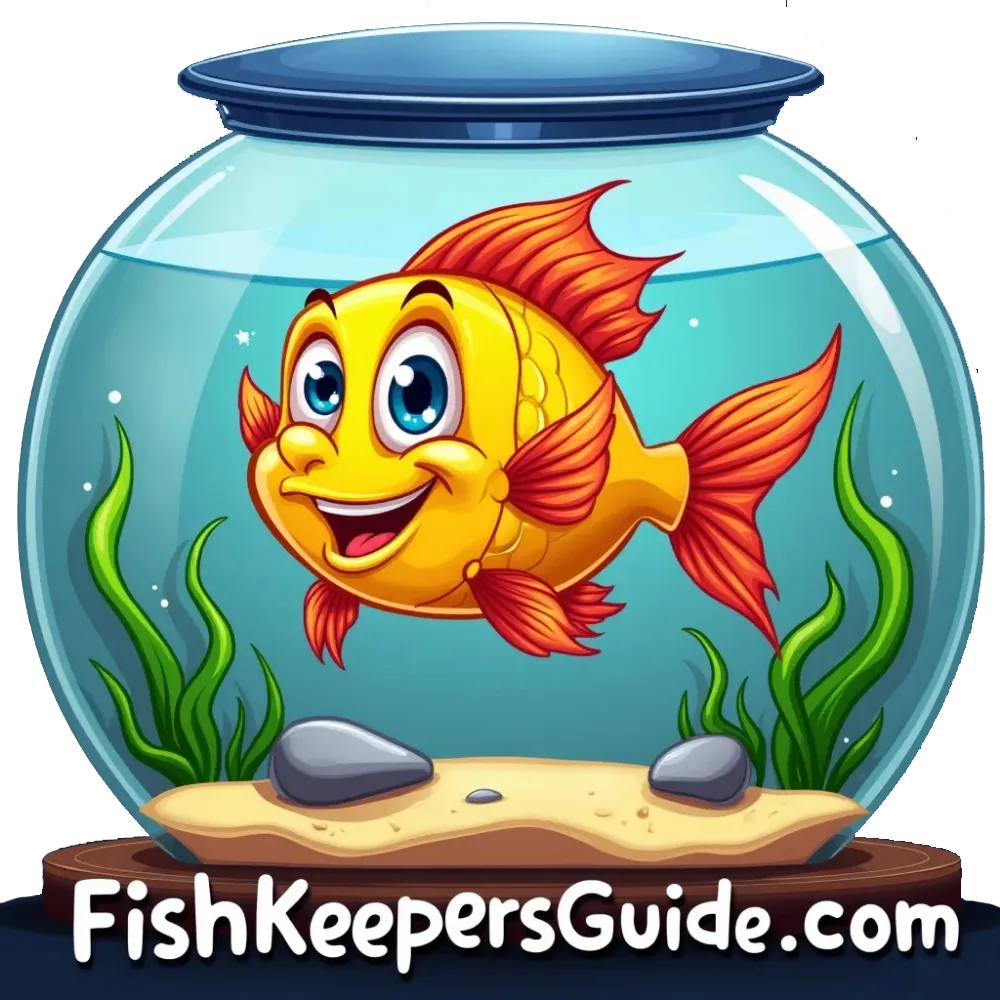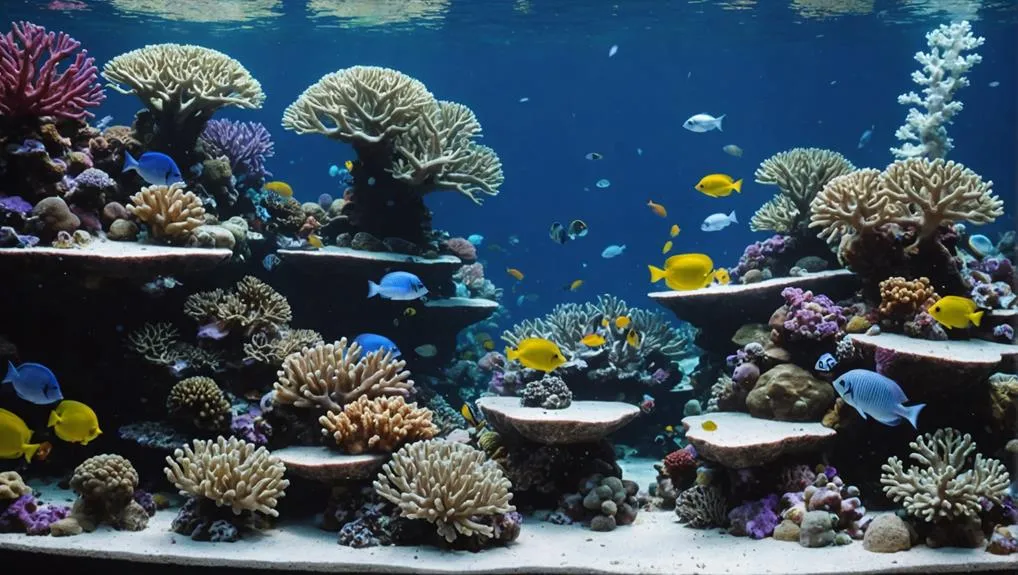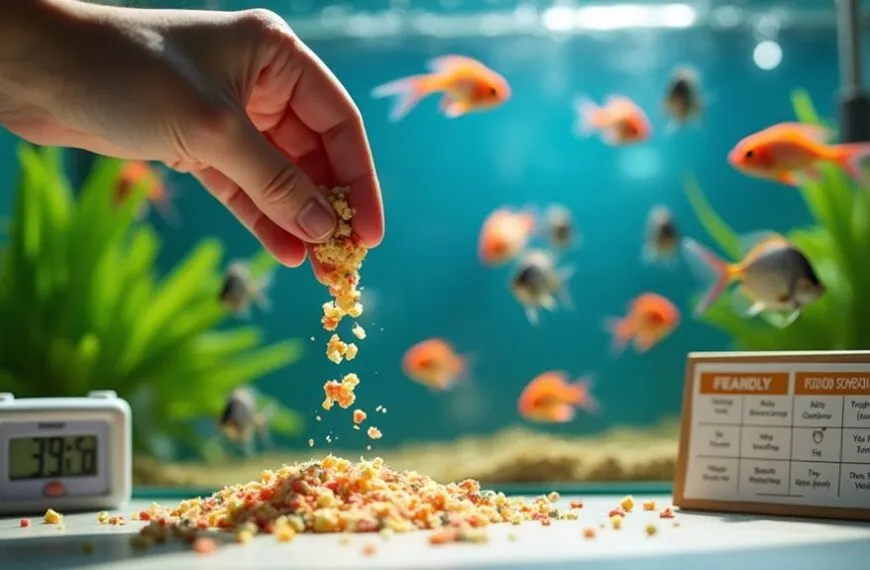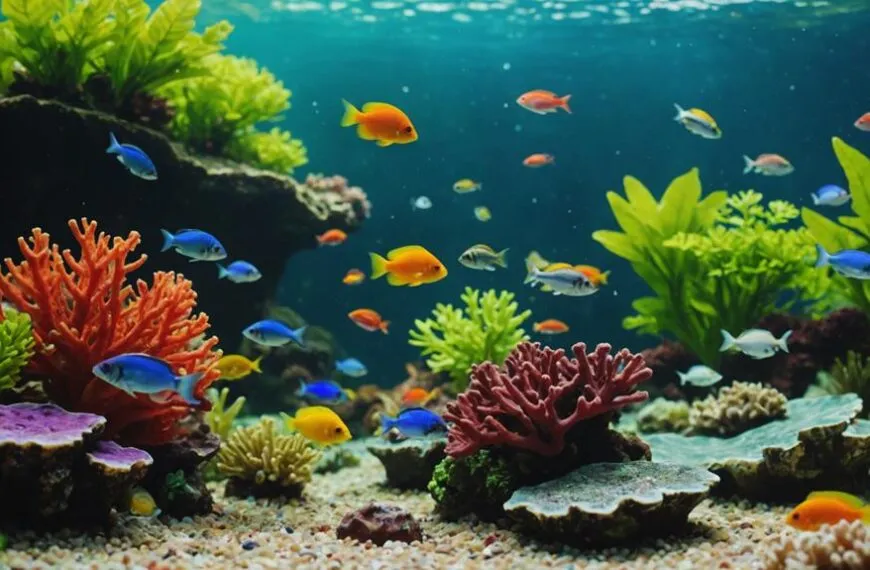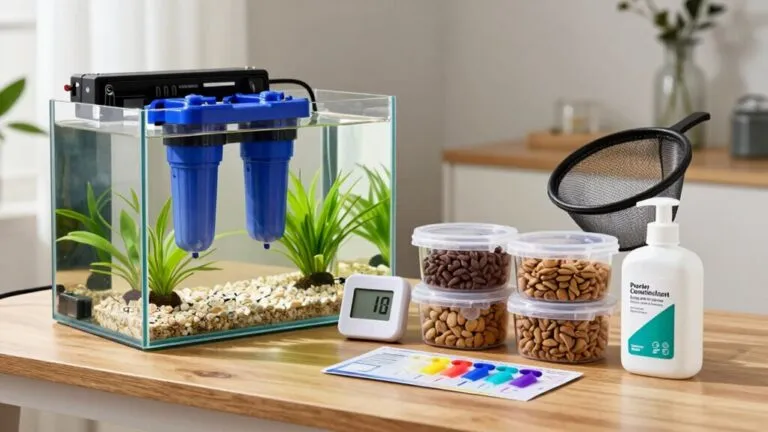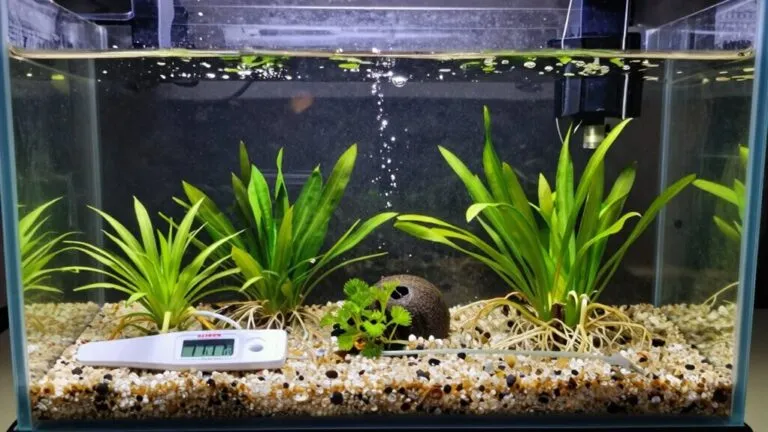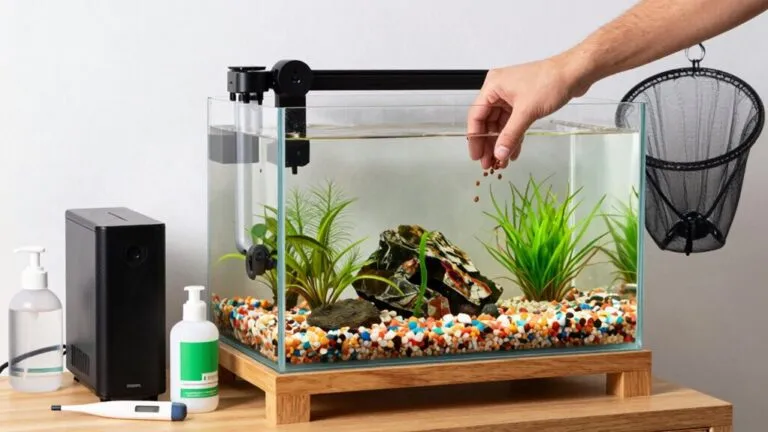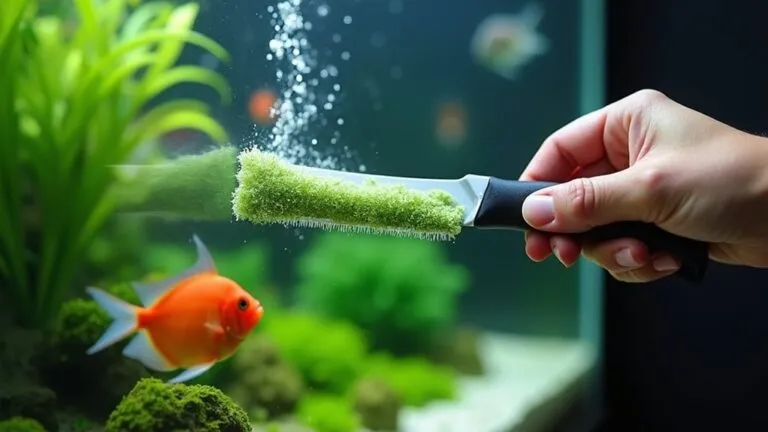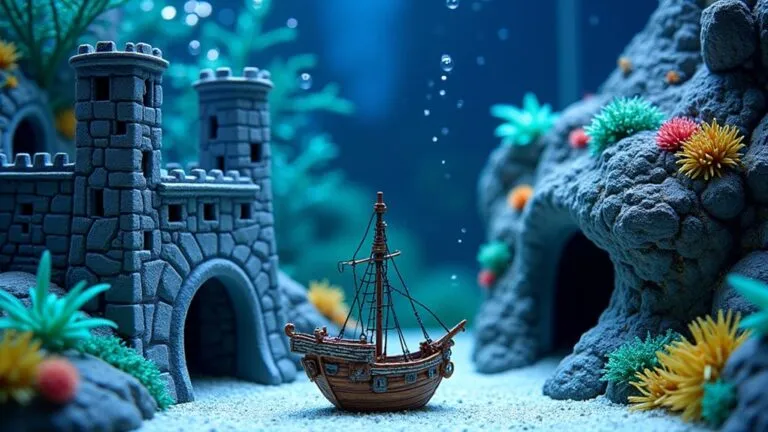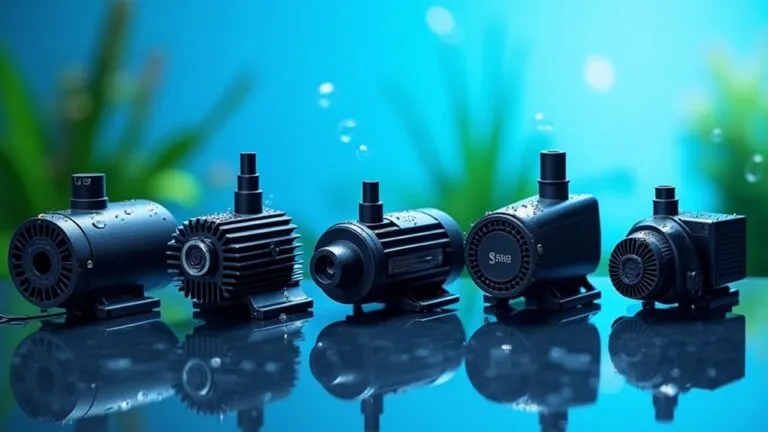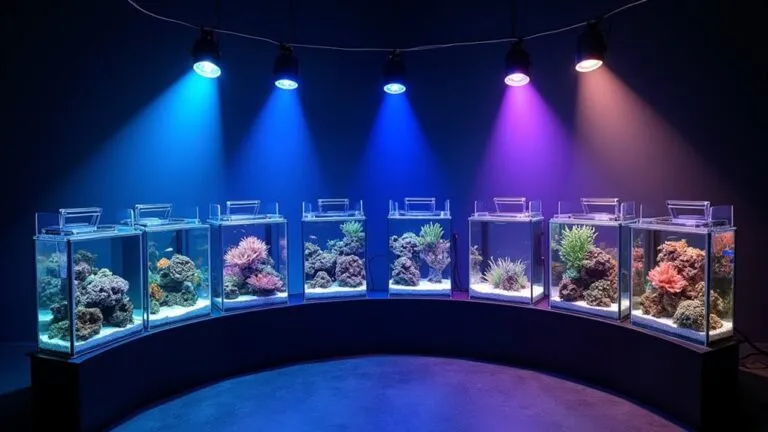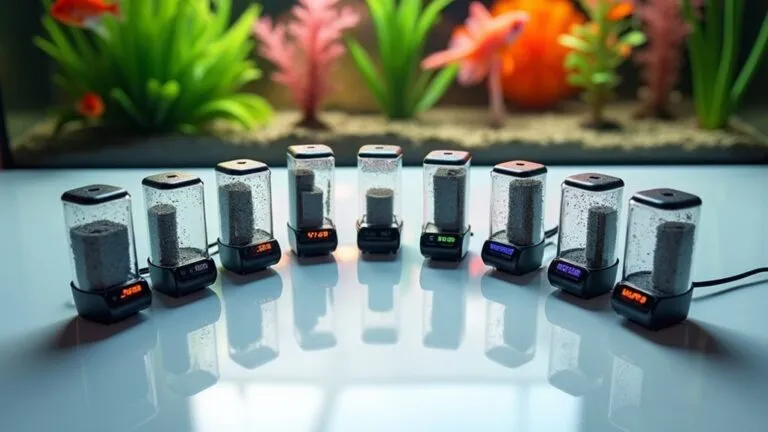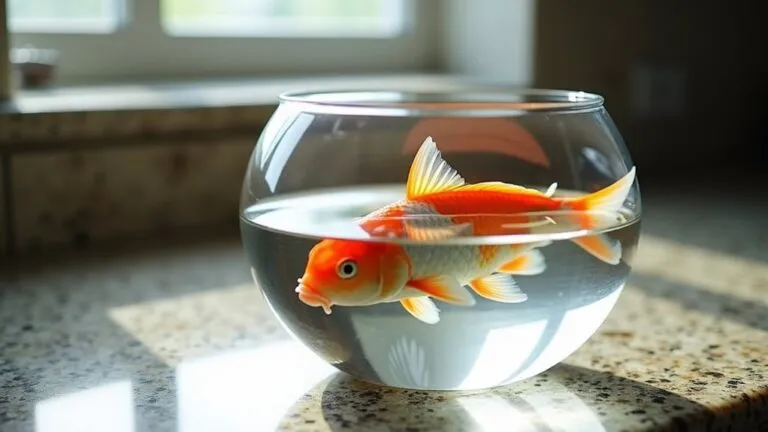Feeding your marine reef tank is crucial for keeping your fish happy and healthy, like hosting a party where everyone gets their favorite snacks! Start with high-quality pellets as your base, and mix in frozen foods like mysis shrimp or seaweed for variety. It's all about balance! Use feeding rings to avoid waste, and stick to a consistent feeding schedule—fish love routine. Be careful not to overfeed; aim for portions they can finish in about 5 minutes. Keep an eye on their behavior too; it'll tell you a lot about their needs. But there's even more tips to explore!
Contents
Essential Feeding Tools
When it comes to maintaining a thriving marine reef tank, having the right feeding tools can make all the difference.
You'll want to start with feeding rings; these handy devices keep food contained in one area, ensuring your fish don't miss out when their dinner drifts away to the overflow.
Speaking of convenience, automatic fish feeders can save you a ton of time. Just set it and forget it! You can enjoy a weekend trip while knowing your fish are still munching on schedule.
For those who prefer frozen food, frozen food defrosters are lifesavers. They let you thaw food slowly, which minimizes waste and ensures your fish get their meal without any fuss.
If you have some picky eaters in your tank, consider using a bulb syringe or pipette. These tools allow you to target feed specific fish, ensuring everyone gets the nutrition they need.
Incorporating these essential feeding tools not only helps in keeping your fish happy and healthy, but it also makes feeding time an enjoyable experience for you.
After all, who doesn't love a well-fed fish?
Variety of Food Types
A diverse diet is crucial for the health and vitality of your marine reef tank inhabitants. Just like you enjoy a mix of foods, your fish and corals thrive on variety too! Incorporating high-quality pellets into their meals ensures they get essential nutrients.
But don't stop there—frozen foods, like mysis shrimp and brine shrimp, are fantastic options to keep their taste buds tingling.
For those herbivorous fish, adding sheet algae (nori) is a must. It not only promotes natural foraging behavior but also keeps them healthy and happy.
And if you want to treat them once in a while, consider fresh foods like squid or scallops. Trust me; they'll love you for it!
Using premium frozen food mixes, such as Rods Food or LRS, can save you time while providing a balanced nutrient profile.
However, it's best to rotate these with other food types to avoid any nutritional gaps. Plus, don't forget live phytoplankton! It supports coral health and contributes to a thriving reef ecosystem.
Effective Feeding Techniques
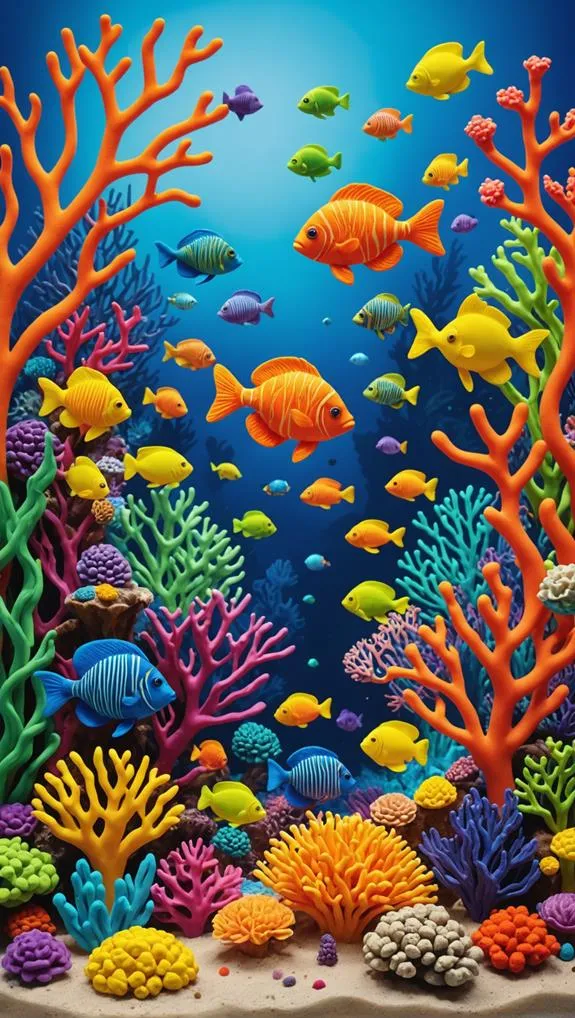
When it comes to keeping your marine reef tank thriving, effective feeding techniques can make all the difference.
You'll want to think about target feeding methods, like using pipettes, to make sure all your picky eaters get their fair share without a mess.
Plus, keeping a consistent feeding schedule ensures everyone's happy and healthy—after all, nobody wants a hangry fish!
Target Feeding Methods
Effective target feeding methods play a crucial role in maintaining the health and vitality of your marine reef tank. You want to ensure that every creature, especially corals and filter feeders, gets the nutrition they need without creating a mess.
Using tools like pipettes or bulb syringes allows you to target feed small amounts of food exactly where it's needed. This precision can help enhance the feeding response and overall health of your tank inhabitants.
Don't forget to turn off circulation pumps during target feeding! This little trick helps your food to flow directly to the slow feeders who might struggle otherwise.
Liquid nutrient solutions work wonders here, as they stick around longer, giving your filter feeders a fair chance to chow down.
Keep an eye on your fish after feeding. Their behavior can tell you if they're enjoying the food or if you need to adjust your feeding regime.
Maybe they prefer a different treat—think of it as your tank's way of giving you feedback.
Feeding Frequency Considerations
Choosing the right feeding frequency for your marine reef tank is essential for maintaining both fish health and water quality. When you ensure your fish eat the right amount of food at the right times, you create a thriving environment for all your tank inhabitants.
- Feed smaller portions that can be consumed in 2-5 minutes.
- Consider target feeding for corals and specific fish.
- Planktivorous fish might need feeding 3-4 times daily.
- Larger herbivores benefit from less frequent meals to graze.
- Rotate food types for a balanced diet.
Regularly monitoring your fish's behavior after meals can help you tweak portion sizes and feeding frequency. If your fish are swimming around like they just won the lottery, it's a sign they're happy!
A consistent feeding schedule not only enhances their diet but also keeps water quality in check, preventing excess waste. Remember, keeping the right feeding frequency isn't just about keeping your fish full; it's about creating a harmonious ecosystem.
Nutritional Requirements
When it comes to keeping your marine fish healthy and vibrant, understanding their nutritional requirements is key.
You'll want to focus on a mix of high-quality proteins, essential fatty acids, and a variety of foods to keep everyone happy and thriving.
Think of it as crafting a gourmet buffet—your fish will appreciate the effort, and you'll enjoy watching them flourish!
Key Nutrients Overview
Maintaining a healthy marine reef tank requires a keen understanding of key nutrients essential for your fish.
These nutrients not only support growth but also boost immune function and overall health.
Here's a quick rundown of what you need to focus on:
- Proteins: Aim for at least 50% in dry foods; frozen foods should have 12% protein and 2% fat.
- Essential fatty acids: Crucial for high-energy fish; multiple feedings each day can help!
- Vitamins: Think oranges or broccoli for Vitamin C, which is great for immune health.
- Minerals: These play a big role in keeping your fish strong and vibrant.
- Varied diet: Include Mysis shrimp, clams, and algae to prevent nutritional deficiencies.
Essential Fatty Acids
Essential fatty acids (EFAs) play a vital role in the health and growth of your marine fish. These essential nutrients, like omega-3 and omega-6 fatty acids, are crucial for vibrant colors, strong immune systems, and even reproductive success.
If you want your fish to thrive, remember that a diet lacking in EFAs can lead to poor growth and health issues—definitely not what you want for your aquatic friends!
To ensure they get enough EFAs, consider incorporating live food into their meals. Marine species like clownfish and tangs will love brine shrimp and mysis shrimp, which are packed with these beneficial fats. Not only do they cater to their natural diets, but they also keep your fish happy and engaged during feeding time.
You might also explore specialty diets or supplements rich in omega-3 and omega-6 fatty acids. Marine algae or fish oil can elevate the nutritional profile of standard feeds, making your fish dance with joy!
Dietary Variety Importance
To keep your marine fish healthy and vibrant, offering a diverse diet is crucial. Just like us, your fish need a mix of nutrients to thrive. A varied diet helps prevent nutritional deficiencies and supports their overall health.
Here are some key points to consider:
- Mix it up: Use pellets, frozen foods, and live options.
- Special needs: Herbivores like tangs love seaweed sheets and high-fiber goodies.
- Encourage natural behaviors: Mysis shrimp and live phytoplankton spark foraging and hunting instincts.
- Enhance color: Rotate protein sources and add color-enhancing ingredients like astaxanthin.
- Stay balanced: Essential fatty acids, vitamins, and minerals are vital for growth and immunity.
Common Feeding Mistakes
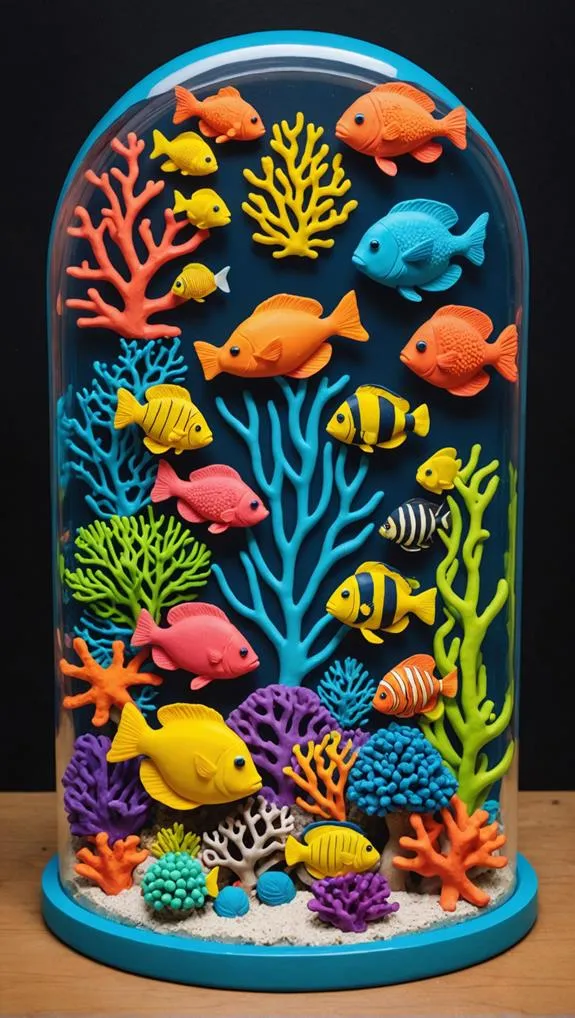
Many aquarists unknowingly make several common feeding mistakes that can jeopardize the health of their marine reef tanks. One of the biggest culprits is overfeeding. It may seem generous, but if uneaten food lingers, it can lead to water quality issues, like high nitrate and phosphate levels.
Next, you might be ignoring the specific dietary needs of different fish species. Not all fish eat the same way, and failing to accommodate their unique diets can cause nutritional deficiencies.
Another mistake is relying on just one type of food. Variety is key! Rotate different foods to ensure a balanced diet for all your tank buddies.
And don't forget about storage—if your fish food's not stored properly, you risk losing its nutritional value. Keep it cool, dark, and dry.
Lastly, tracking portions is crucial. If you don't monitor what you're feeding, you could easily end up overfeeding or underfeeding. Use a little notebook or an app to help with that!
Observing Fish Behavior
Observing fish behavior during feeding can reveal a lot about their overall health and well-being. By paying close attention, you can make informed choices that promote a happy, thriving tank.
- Active eaters usually indicate good health.
- Lethargic fish may signal illness or distress.
- Aggressive behavior during feeding shows social hierarchies.
- Feeding preferences help tailor your approach.
- Monitoring trends prevents overfeeding and ensures proper nutrition.
Watching your fish as they eat is like being a detective in their underwater world. If they're darting around eagerly, that's a good sign!
But if they seem uninterested or sluggish, it could mean something's off. Keep an eye on how they interact, too; some might be a bit pushy during meal times, which can tell you about their social dynamics.
If you notice any changes in their feeding habits, don't ignore it. It could be a sign of stress from water quality issues or even overcrowding.
Frequently Asked Questions
How Many Times a Day Should I Feed a Reef Tank?
You should feed your reef tank 1-2 times daily, adjusting based on fish behavior and nutrient absorption. Monitor how they respond to feeding frequency, ensuring each portion meets their dietary needs without overloading the system.
When Should I Feed My Corals Reef Tank?
You should feed your corals every 3-4 days, using effective coral feeding techniques. Optimal feeding times, like evenings, enhance nutrient absorption strategies, ensuring your corals thrive while minimizing excess waste in the tank.
How Do I Keep My Nutrients Stable in My Reef Tank?
Did you know that unstable nutrient levels can cause up to a 30% decline in coral growth? To keep your reef tank thriving, prioritize nutrient balancing, maintain a consistent feeding schedule, and monitor water quality regularly.
How Long Can You Go Without Feeding Reef Tank?
You can typically go 3-5 days without feeding your reef tank, but watch for fish starvation signs. If needed, use emergency feeding techniques to prevent nutrient loss impacts and ensure your aquatic friends stay healthy.
Final Thoughts
Feeding your marine reef tank doesn't have to be complicated. By using the right tools, offering a variety of foods, and paying attention to your fish's needs, you can create a thriving underwater paradise. Did you know that a well-fed fish can grow up to 50% faster than one that's not? So, let's make mealtime fun! Just remember to watch their behavior and avoid common mistakes. Your fish will thank you with their vibrant colors and happy antics!
